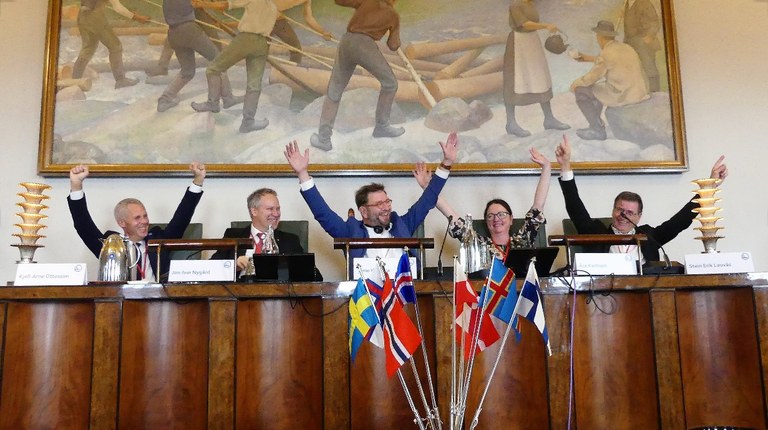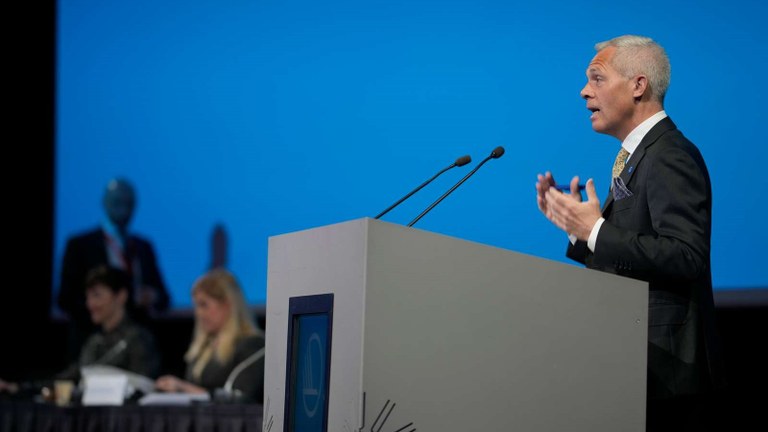Kjell-Arne Ottosson: Wants faster train connections and new Council of Minsters
The Nordic Council unanimously declared five years ago it wanted to create a council of ministers for transport and infrastructure as part of the Nordic cooperation. But so far the countries’ prime ministers have not picked up on this, despite major infrastructure investments inside and between the countries.
“A council of ministers for transport and infrastructure would offer a new way for Nordic ministers to meet and improve cooperation in this area. If our prime ministers want the Nordic region to be the most integrated region in the world, it is time to prove it,” says Kjell-Arne Ottosson, a member of the Swedish parliament from the Christian Democrats, and the Chairman of the Nordic Council’s Committee for Growth and Development in the Nordic Region.
In 2018 in Iceland, a unanimous Nordic Council Session agreed to recommend that the Nordic Council of Ministers establish a designated council of ministers for transport and infrastructure. All the parties, all party groups, all the countries and autonomous areas supported this. After that, nothing has happened apart from repeats of the recommendation.
Kjell-Arne Ottosson is one of the people driving the issue both during Nordic Council sessions and in the Swedish parliament.

The transport committee, with Kjell-Arne Ottosson to the left, gives a cheer during a debate on communication issues during the 2022 Nordic Council session in Helsinki. The parliamentarians wanted to create a council for ministers for transport and infrastructure. Photo: Björn Lindahl
“Several major infrastructure programmes in the Nordics are being planned or are in the pilot study phase. These are looking both at connecting the Nordic countries, for instance Oslo-Stockholm 2.55, the Öresund Region metro, as well as improving train links between Oslo and Hamburg. A designated council of ministers for transport and infrastructure would serve as an umbrella organisation and allow us to get an overview and closer cooperation,” says Kjell-Arne Ottosson.
The Pandemic did much damage
He lives near a border himself and is passionate about reducing border obstacles. His home lies in Årjäng municipality around 100 metres from the Norwegian border. His mother is Norwegian, his brother is married in Norway and Kjell-Arne Ottosson himself has taken time off from his job as a teacher in Rømskog in Norway.
His experience with the pandemic has also given him extra motivation to create stronger infrastructure cooperation between the Nordic countries.
“We live as if the border is not there. Here, your house might be in Sweden while your outbuilding is in Norway. Suddenly the border was shut and people could not travel to work, or say goodbye to their loved ones,” he says.
The closed border meant so much more than losing the border trade, although that was serious enough. 400 – 450 people losing their jobs in Töcksfors is equivalent to 120,000 people in Stockholm becoming unemployed. But what hit the hardest was not being able to see your closest family, says Kjell-Arne Ottosson.
The border was completely shut even though transmission rates were low where he lives. The closure created deep wounds between people living in an area where it has been possible to move freely for hundreds of years.
There are many stories. A Swede who had lived in Norway for 15 years could not have hotel breakfast with his Norwegian colleagues, despite the fact that he had not recently visited Sweden. Swedes in Norway had to carry high-vis vests so that they would be easy to spot.
Kjell-Arne Ottoson has felt the effects of the closed borders himself. When it reopened and he returned to his Norwegian home, he was met with an uncomfortable silence rather than being welcomed with the normal, everyday chat.
“Shutting people out like this is more dangerous than the infection, I think. Things are becoming normal again but there are still many who don’t dare look for jobs across the border. The wounds are still there, but the closer the links we create, the less risk we face for ending up in a similar situation as what we had during the pandemic.”
Anything linking people together is important
In a motion before the Swedish parliament, Kjell-Arne Ottosson writes that “we have a long way to go before we re-establish the contacts and heal the wounds, not least in the border areas”. In the motion, he calls for a new, more direct and faster railway link between Oslo and Stockholm.
The aim is to cut travel time to 2 hours and 55 minutes, hence the name of the project – Oslo-Sthlm 2.55. But this goes beyond quicker transit, less environmental impact than flying and expanding the labour market. A joint project for a faster train line would also mean cooperation across national borders, which will reestablish and strengthen contacts and help heal the wounds created by the pandemic.
He believes anything that links Nordic people together is important, so he continues to push the case for a council of ministers for transport and infrastructure.

Kjell-Arne Ottosson raises the issue of establishing a council of ministers for transport and infrastructure as often as he can. This also happened during the Nordic Council's special session in Reykjavik earlier this year. Photo: Eyþór Árnason/norden.org
Kjell-Arne Ottosson has often tried to get an answer to what is stopping the creation of a council of ministers for transport and infrastructure, including during a discussion with the then Minister for Infrastructure Tomas Eneroth from the Social Democrats.
Last winter, the Committee for Growth and Development in the Nordic Region invited the leaders and deputy leaders from all of the Nordic countries' transport committees in order to keep the issue of a designated council of ministers for transport and infrastructure alive.
“Many wanted this work to continue,” says Kjell-Arne Ottosson.
He has never got a proper answer to why the Nordic Council’s unanimous recommendation has not yet been realised. Sweden’s former Minister for Infrastructure Tomas Eneroth said he felt cooperation between the Nordic infrastructure ministers functioned well and informally without a designated council of ministers.
“Some civil servants have also claimed that cooperation deteriorates in a council of ministers, but if that were the case all councils of ministers ought to be closed down,” says Kjell-Arne Ottosson.
Now, with a new government in Sweden, Andreas Carlson from the Christian Democrats has taken over as Minister for Infrastructure.
“This allows me to apply pressure from within and move things forward that way,” says Kjell-Arne Ottosson.
 Follow us on Facebook
Follow us on Facebook
